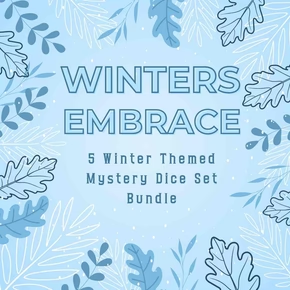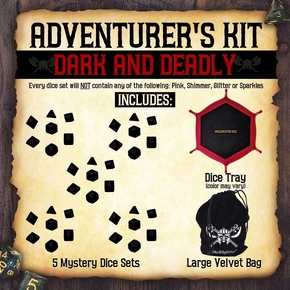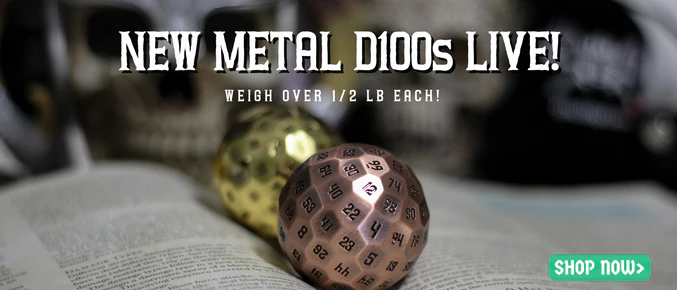
The Ultimate Guide to Pathfinder Classes
Table of Contents:
A Simple Player Guide to Classes
Pathfinder has been Dungeon & Dragons’ biggest competitor since its creation back in that ambiguous 3.5 era, and it rode to the top on the back of customization. Pathfinder is a game by Paizo where you can create practically any sort of character if you know how to navigate the system. But for those of us who aren’t pathfinder DnD veterans, what the heck are all these classes about? If you’re intimidated by the wall of options before you, stick with us in this ultimate guide as we boil down every official Pathfinder DnD class and what they’ll do for your new character.
Core Classes
These are the classes that’ll be the most familiar if you’ve played D&D or most other roleplaying games. They’re relatively straightforward, though the revised or “unchained” versions can confuse things.
Barbarian
- Main Stats - Strength, Constitution
- Roles - DPS, Tank
Barbarian works exactly like you’d expect, high HP, hitting things with great axes and unbridled rage. Word of warning though, the rage mechanic of the “core barbarian” is kind of wonky and full of unnecessary math. They fixed it though with the “unchained barbarian” which plays almost the same but with way less work.
Bard
- Main Stats - Charisma, Dexterity
- Roles - Party Support, Party Face, Skill Monkey, Secondary Spellcaster
Bards are extremely versatile, they get all the skills, good spells, and are pretty decent in combat. You’ll often find yourself not being the best for any particular role, but great at fulfilling any role that’s needed.
Cleric
- Main Stats - Charisma, Constitution
- Roles - Healer, Primary Spellcaster, DPS
Clerics are far more than heal-bots, and you can build your cleric to be a damage dealing monster, powerful caster, or yes, a master of healing. You can also focus on strength and create a competent melee caster.
Druid
- Main Stats - Wisdom, Dexterity
- Roles - Primary Spellcaster, Toolbox, DPS, Scout
Druids tend to play either as full casters, focusing on unique powerful spells or on specific utility spells. Or you can focus on your wild shape abilities, and basically function as a bestial fighter that also has access to spells when they’re not biting and tearing.
Fighter
- Main Stats - Strength or Dexterity, Constitution
- Roles - Diverse, generally either DPS or Tank, possibly Scout
Fighters are a blank canvas that works for a ton of different concepts. Once you pick that concept you tend to be stuck with it though as their abilities lend themselves to narrow and focused builds that revolve around a particular weapon or fighting style.
Monk
- Main Stats - Strength, Dexterity, Wisdom
- Roles - Tank, DPS
Pathfinder’s first take on monks was terrible, so make sure you use the unchained version that actually works. Unchained monks get to tank or avoid a lot of hits as they dish out their own flurry of strikes.
Paladin
- Main Stats - Strength, Charisma
- Roles - Tank, Melee DPS, Secondary Healer, Party Face (with some work)
A bit like a strength and armor build fighter but with some cleric-ish divine spells and healing. With Charisma-based spellcasting, you can even become a Party Face with the right traits. Don’t be the only healer though, you won’t have enough to go around.
Ranger
- Main Stats - Strength or Dexterity, Wisdom
- Roles - DPS, Scout
Rangers have a lot of similarities to base fighters, with some druid-ish spellcasting thrown in and a heap of situational survival abilities. Just like the fighter there’s a lot of variation in builds, but once you’ve picked, you’re encouraged to stick to that role.
Rogue
- Main Stats - Dexterity, Constitution
- Roles - Scout, Skill Monkey, Party Face, DPS
The original rogue was fine at first but got overshadowed by all the later additions to the game, you’re best off using the “unchained” version of rogue. Great at scouting and trapfinding, good DPS but highly dependent at getting your sneak attack off which isn’t guaranteed.
Sorcerer
- Main Stats - Charisma, Dexterity
- Roles - Blaster Caster, DPS, Party Face
Sorcerers know fewer spells but get way more of them per day. Sorcerers are a great pick if you want your caster to be launching fireballs and other damage spells constantly. Not a good utility caster though, so keep that in mind.
Wizard
- Main Stats - Intelligence, Dexterity, Constitution
- Roles - Primary Spellcaster, Toolbox, DPS
Downright broken strong at high levels, wizards will always be in the top tier of magic users in pathfinder. You get an extremely wide variety of spells and you’ll almost always have the right tool for the job. The downside is squishiness, which is what your party is for.
Base Classes
In this guide, you’ll find all the new classes that started out in the many additional books that have piled onto the Pathfinder DnD library over the years. Rather than just reskins or remixes, each of these is a unique base class in their own right.
Alchemist
- Main Stats - Dexterity, Intelligence
- Roles - DPS, Party Support, Healer
The iconic bombs and mutagens aren’t actually great unless you spec for them. Alchemists have a ton of options, but I’d recommend focusing on one rather than trying to do everything. Pick from bombs, mutagen/polymorph effects, healing, or party buffing, and center around it.
Cavalier
- Main Stats - Strength, Charisma, Constitution
- Roles - Tank, Party Support, Party Face, DPS
The cavalier is primarily a mounted fighter and gains a ton of stuff specifically for mounted combat. It ends up playing like a mix of fighter and paladin but is pretty dependent on a mount for most of your abilities. Grab a lance and get to glorious charging.
Gunslinger
- Main Stats - Dexterity, Wisdom
- Roles - DPS
Gunslinger is a very simple class once boiled down, as all of its abilities are variations of “shoot the bad guy” such as “shoot the bad guy harder” or “shoot the bad guy again”. Grab gunslinger for some stylish shooting but expect to be bored if there’s a lot of time between combats.
Inquisitor
- Main Stats - Wisdom, Strength or Dexterity
- Roles - Party Support, DPS, Secondary Healer, Secondary Spellcaster
Think of the inquisitor as the divine magic bard. You’re not the best at most things but you provide party buffs, enemy debuffs, and can sort of shift to any role the party needs. You gain a lot of skills, decent healing, and can potentially turn the tide no matter what role you’re currently filling.
Magus
- Main Stats - Intelligence, Dexterity
- Roles - DPS, Primary Spellcaster, Party Support
The magus combines wizard spellcasting with fighter resilience. Swing your sword and critically hit with the arcane spells you cast out of them. You lose a lot of the fighting style and combat abilities of fighters, and you don’t have nearly as many spells as a wizard, but you can still buff the team when need be and spell strikes are fantastic.
Oracle
- Main Stats - Charisma, Constitution
- Roles - Blaster Caster, Primary Spellcaster, Healer, Party Face
The oracle is basically the divine version of a sorcerer. Way more spells per day than a cleric but knows fewer of them. You can essentially play it as a more focused cleric, a blaster caster with divine magic, or since it’s Charisma-based you can even play as the party face.
Shifter
- Main Stats - Strength or Dexterity, Constitution
- Roles - DPS, Tank, Scout, Toolbox
The shifter is basically a druid with all the spellcasting removed and the wild shape abilities ramped up. Think fighter or barbarian but with natural attacks and beast forms. Scouting as an animal is useful and you’ll occasionally get toolbox solutions to problems by choosing from your many beast form options.
Summoner
- Main Stats - Charisma, Dexterity
- Roles - DPS, Tank, Secondary Spellcaster
The summoner is an odd duck, and one of the only pathfinder classes I’ve had to ban in my games. The summoner gets to build a special animal companion from the ground up, and when done correctly it can be completely game-breaking. Built poorly though you’re left with a weak creature and a sub-par caster. Make sure to use the “unchained” version for more eidolon options.
Witch
- Main Stats - Intelligence, Dexterity
- Roles - Primary Spellcaster, Party Support, Secondary Healer
The witch is very much like a wizard, except with access to healing magic and in exchange for losing a bit of your magical top end you get “hexes”. You get to use your hexes without cost, and they can apply some powerful debuffs to your enemies or buffs to your allies.
Vigilante
- Main Stats - Dexterity, Charisma
- Roles - Party Face, Scout, DPS
Batman, you get to be Batman. The vigilante class is all about setting up a “hero” and your “alter ego” and you get powers and abilities depending on if you’re currently in “Bruce Wayne” mode or “Batman” mode. It really doesn’t work for normal adventuring games though, and you should only consider it for games centering on a single city or other primary location.
Hybrid Classes
Pathfinder created “hybrid classes” almost like pre-built multiclass options. Each one has their own “parent” classes and typically focuses on one primary aspect of both classes to remix and center on.
Arcanist
- Main Stats - Intelligence, Charisma
- Roles - Primary Caster, Blaster Caster, DPS
- Parent Classes - Sorcerer, Wizard
Arcanist takes the breath of spell knowledge of the wizard and mixes it with the spontaneous casting of the sorcerer along with a metamagic-like ability to augment spells called “exploits”. Still extremely squishy, and now needing two mental ability scores, the arcanist doubles down on the spellcaster role but benefits greatly from it.
Bloodrager
- Main Stats - Strength, Charisma
- Roles - Tank, DPS
- Parent Classes - Barbarian, Sorcerer
I’d classify bloodrager as mostly barbarian but with a slice of sorcerer thrown in. You get most of what a barbarian gets and a few sorcerer spells to cast while in the middle of raging. Going down from a 1d12 hit die to a 1d10 hit die is the main trade off here. It’s a great option if you want to play barbarian but with a bit more variety.
Brawler
- Main Stats - Strength, Dexterity, Constitution
- Roles - Tank, DPS
- Parent Classes - Fighter, Monk
Remove all the ki powers and mysticism from the monk, add a lot more punching stuff, and you’ve got the brawler. Brawlers outclass the base monk for damage and gain the great fighting style and maneuvers of the fighter. You’re pretty pigeonholed into combat, so be prepared to be bored between fights, but the fights will definitely be fun.
Hunter
- Main Stats - Wisdom, Strength or Dexterity
- Roles - DPS, Scout
- Parent Classes - Druid, Ranger
Druids and Rangers may get animal companions, but hunters get the BEST ones. You’re basically one player spread across two bodies more than a player character and an animal. To play a hunter well takes using the teamwork feats correctly, so study them thoroughly when putting your hunter together.
Investigator
- Main Stats - Dexterity, Intelligence
- Roles - Skill Monkey, Toolbox, Scout
- Parent Classes - Alchemist, Rogue
You get the extracts and spellcasting from the alchemist with the skills and sneakiness of the rogue. Probably best suited for mystery campaigns with lots of clues and puzzles. You CAN work as a DPS technically, but the low HP and armor make it hard for investigators to keep up.
Shaman
- Main Stats - Wisdom, Dexterity
- Roles - Primary Spellcaster, Blaster Caster, Healer, Party Support
- Parent Classes - Oracle, Witch
The shaman is essentially an oracle with slightly less spellcasting in exchange for hexes. Hexes are usually worth the exchange and allow shamans more buff and debuff options without really losing that much in terms of divine magic.
Skald
- Main Stats - Charisma, Strength, Dexterity
- Roles - Party Face, Party Support, DPS, Secondary Spellcaster
- Parent Classes - Barbarian, Bard
More bard than barbarian, but your songs cause everybody to get SWOLE. Skald is a very nice option if you wanted to play a combat bard anyway, as you have enough barbarian in you to be a bit more survivable while buffing the party.
Slayer
- Main Stats - Strength, Dexterity, Constitution
- Roles - DPS, Scout, potentially Tank
- Parent Classes - Ranger, Rogue
Slayer takes all the sneaky and DPS or the rogue and slaps on the combat versatility of a ranger. Slayers are extremely flexible and can fit into a ton of different builds and styles. Good to look at if you have a combat style you’re really interested in and you want it to have the extra punch of sneak attack.
Swashbuckler
- Main Stats - Dexterity, Charisma, Constitution
- Roles - Party Face, DPS, potentially Tank
- Parent Classes - Fighter, Gunslinger
Swashbucklers take all the dexterity-based fighting styles of the fighter and combine them with the gunslinger’s grit point system (now called panache points). Swashbucklers are about fencing, style, and typically crit fishing as they’re some of the best critical hitters in the game. I highly recommend swashbuckler if you’re looking to play a fighter, but also want to be the face of the party.
Warpriest
- Main Stats - Strength, Wisdom
- Roles - DPS, Primary Spellcaster, Secondary Healer
- Parent Classes - Fighter, Cleric
You’d think this combo would play like a paladin, but really it just takes clerics and focuses them down to a combat role. You can perform the other roles of a cleric, just not quite as well. Warpriests get a ton of incentive to get stuck into the front lines and you should consider it if you were building a cleric for combat anyway.
Occult Classes
Psionics are still shunned by veteran players to this day as a broken and overpowered mess (which they were). Pathfinder attempted to fix that with their “occult” classes, and while some DMs will still ban them, these are actually quite fair. In fact, in most cases I think they overcorrected and made these classes slightly underpowered.
Kineticist
- Main Stats - Constitution, Dexterity
- Roles - DPS, Toolbox
From the ground up, kineticists are “benders” from “Avatar: The Last Airbender”. Pick an element and become its master, and in later levels you can even combine elements into new and awesome forms. You have a lot of control over your blasts and it feels a lot more dynamic than just dealing damage (though that’s what it mostly boils down to). They're hard to pin down role-wise but are generally good at dealing damage and have a lot of customizable options (with really cool flavor).
Medium
- Main Stats - Charisma, Constitution
- Roles - Party Face, Toolbox
You’ve got spirits flowing through you, but sadly the end result is somewhat lackluster. You can serve as a fine face, but the spellcasting is easily overshadowed by other classes. I’ve played mediums before and each time I’ve wished I’d selected a different class. It works alright if you’re playing in a campaign with a lot of ghosts and spiritual themes but pass it otherwise.
Mesmerist
- Main Stats - Charisma, Dexterity
- Roles - Party Support, Party Face, Toolbox, Secondary Spellcaster
Mesmerists have a lot of ways to debuff the enemy, and then use spells that take advantage of those debuffs. Really though, you’ll be depending on your party quite a bit, as you don’t have the magical breadth to be a full caster, or many ways of actually finishing off an opponent. MAYBE try mesmerist if your party already has all its main roles filled but be prepared for sidelining and fringe support from day one.
Occultist
- Main Stats - Intelligence, Dexterity
- Roles - Party Support, Toolbox, Secondary Spellcaster
Occultists are COMPLICATED, and the end result isn’t all that useful beyond a party support character with some limited spellcasting. You gain access to summoning abilities, but beyond the fiendish or undead themes the summons aren’t great. All in all, they’re not worth the headache. You’ll need to track multiple resources that’ll fluctuate through each adventure, you’ve been warned.
Psychic
- Main Stats - Intelligence, Dexterity, Constitution
- Roles - Primary Spellcaster, Party Support, Toolbox, Blaster Caster
Probably the most straightforward and powerful of the occult classes. You’re basically a sorcerer with a bit of wizard thrown in that gets to use all the psychic spells. Based on your spell choices you can play whichever casting role you’d like except healer. Grab this if you want to play a spellcaster but are interested in all these fancy occult spells.
Spiritualist
- Main Stats - Wisdom, Constitution
- Roles - DPS, Tank, Secondary Spellcaster, Party Support
Spiritualists are essentially hunters except the actual “character” is a spellcaster rather than a martial character. You gain a spooky friend who puts in most of the effort, and the spiritualist themselves will spend most of their time supporting it. Sadly, because you’re too squishy to get into combat with it, you can’t make good use of teamwork feats like the hunter can.
Alternate Classes
Pathfinder has a few classes that are essentially “reskins” of existing classes for flavor. They’re different enough to be their own classes, but just barely. Take a look if you’re interested in a class but bored of their fluff.
Antipaladin
- Main Stats - Strength, Charisma
- Roles - DPS, Tank, Party Face
- Base Class - Paladin
Essentially a darker, meaner paladin. You have most of the same abilities, but you drop the healing and party buff abilities in favor of more damage and some nasty debuff abilities. You really can’t play a “nice” antipaladin though, so make sure your next campaign can handle a knight of pure evil before showing up to “save the world”.
Ninja
- Main Stats - Dexterity, Charisma
- Roles - Scout, Party Face, DPS, Toolbox
- Base Class - Rogue
Ninjas are rogues with a touch of monk ki and a lot of nasty tricks. They fall behind the rogue in terms of raw damage but have way more options for dealing with any given situation. Switch from rogue to ninja if you’d much rather trick and outthink your way through a combat instead of just stabbing a lot (though there will be a fair bit of that as well).
Samurai
- Main Stats - Strength, Constitution
- Roles - DPS, Tank, Party Support
- Base Class - Cavalier
Samurai take the cavalier and drop the whole “mounted combat” thing in favor of better DPS and more combat versatility. You can essentially play a samurai as a fighter but with the party buffs from cavalier. There is also the option to work your way back into mounted combat with samurai, but at that point you might as well stick with cavalier, regardless of the cool samurai flavor.
👉 GET THE PATHFINDER CORE RULEBOOK HERE
--
Enjoy this Guide? You May Also Like:
Need a New Dice Set? Check out our DND Dice here.They are perfect for every gamer as a gift or just treating yourself!
Thinking about other classes? Check out our giant list of D&D 5e Tools and Tips here.
New to find a D&D Group? Check out our guide on How to Find a D&D Group.

Disclaimer
Last updated: January 27, 2019
The information contained on www.SkullSplitterDice.com website (the "Service") is for general information purposes only.
www.SkullSplitterDice.com is a participant in the Amazon Services LLC Associates Program, an affiliate advertising program designed to provide a means for sites to earn advertising fees by advertising and linking to Amazon.com. (source: Section 5)
Blueshift Nine, LLC assumes no responsibility for errors or omissions in the contents on the Service.
In no event shall Blueshift Nine, LLC be liable for any special, direct, indirect, consequential, or incidental damages or any damages whatsoever, whether in an action of contract, negligence or other tort, arising out of or in connection with the use of the Service or the contents of the Service. Blueshift Nine, LLC reserves the right to make additions, deletions, or modification to the contents on the Service at any time without prior notice.
Blueshift Nine, LLC does not warrant that the Service is free of viruses or other harmful components.
Affiliate disclaimer
This affiliate disclosure details the affiliate relationships of Blueshift Nine, LLC with other companies and products.
Some of the links are "affiliate links", a link with a special tracking code. This means if you click on an affiliate link and purchase the item, we will receive an affiliate commission.
The price of the item is the same whether it is an affiliate link or not. Regardless, we only recommend products or services we believe will add value to our readers.
By using the affiliate links, you are helping support the Service, and we genuinely appreciate your support.
Affiliate advertising programs that the Service uses are:
- Amazon Services LLC Associates Program
- As an Amazon Associate, I earn from qualifying purchases.
- Blueshift Nine, LLC is a participant in the Amazon Services LLC Associates Program, an affiliate advertising program designed to provide a means for sites to earn advertising fees by advertising and linking to Amazon.com or endless.com, MYHABIT.com, SmallParts.com, or AmazonWireless.com.
- Pages on this Service may include affiliate links to Amazon and its affiliate sites on which the owner of this Service, Blueshift Nine, LLC, will make a referral commission.



